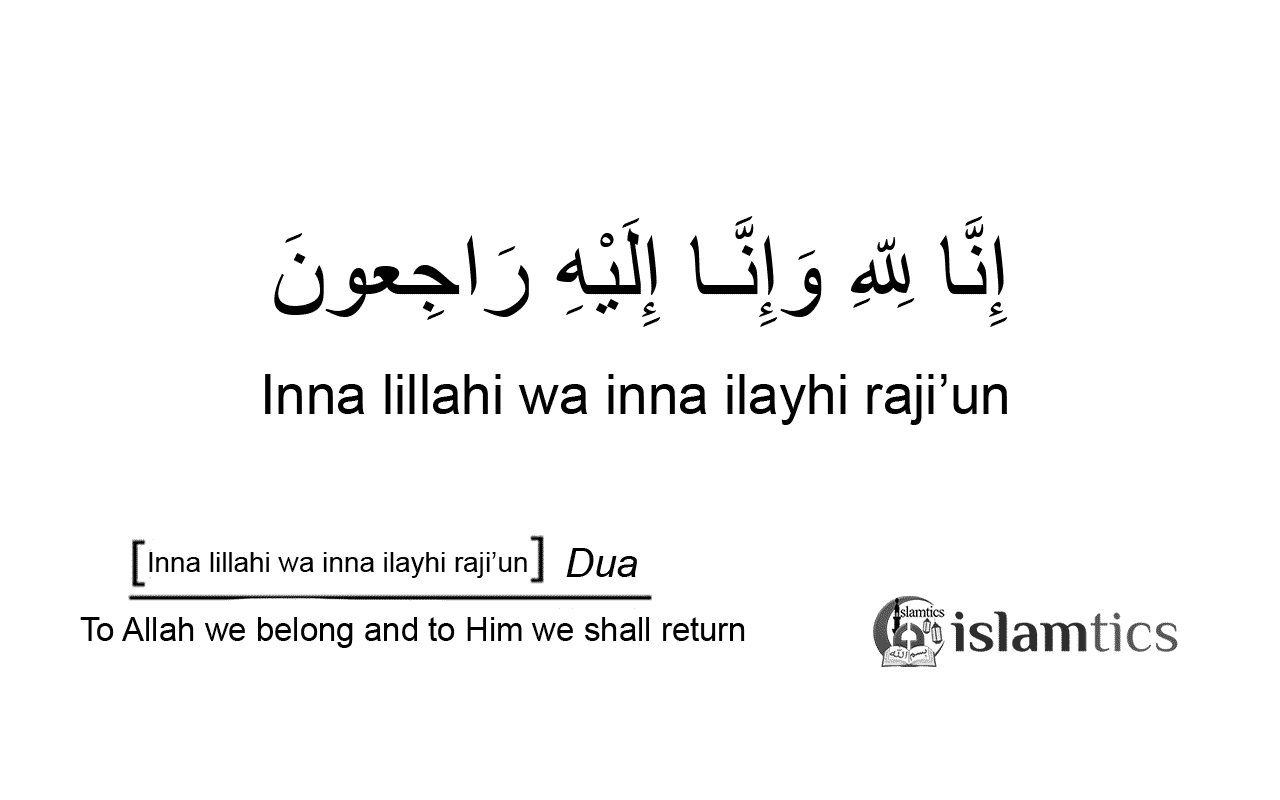
Inna lillahi wa inna ilayhi rajiun muslimpro Inna lillahi wa
Inna Lillahi wa inna ilaihi raji'un in English means "We surely belong to Allah and to Him we shall return". In most cases, you hear it when someone passes away, or when someone experiences or goes through a tragedy. Inna lillahi wa Inna ilayhi rajioon is said in many cases like when losing something or suffering from something.

Makna inna lillahi wa inna ilaihi raji’un Artofit
Inna lillahi wa Inallah e raji oon Images Rewards of saying inna lillahi wa inallah e raji oon. there are many virtues of saying Inna Lillahi Wa Inallah E Raji Oon. 1. Allah will compensate you for something better. Inna Lillahi Wa in Allah e Rajioon is the phrase that has been used by Prophet Muhammad (S.A.W) to give his followers hope and.

Inna lillahi wa inna ilayhi raji'un in Arabic, Meaning & When to say islamtics
Here is the definition of every word: Inna: literally ', indeed, assuredly, verily'. Lillahi: We are Allah's property..

Inna Lillahi Wa Inna ilayhi Raji'un in Arabic Meaning in English
Inna lillahi wa inallah e Raji oon It calls for optimism and comfort for the afflicted. It aims to raise the morale and stabilize the psychological state. It is a fortress for the Muslim from falling into dissatisfaction with the decree and a salvation for him from objection to fate. Inna lillahi wa inallah e Raji oon addresses the afflicted.

INNA LILLAHI WA INNA ILAYHI RAJI'UN EXPLAINED YouTube
The Islamic Dua "Inna Lillahi Wa Inna Ilayhi Rajiun" holds much significance in the lives of Muslims. It serves as a reminder of our connection with Allah and our mortality. Each word in the Quran and Hadith carries immense significance and offers invaluable guidance to humanity.

26+ Inna Lillahi Wa InallahERaji'oon Quotes Kemprot Blog
For every affliction, one should say: 'Inna lillahi wa inna ilaihi rajiun - We belong to Allah and to Him we shall return.'. For the affliction of death, one should add: ' Allahumma Ajjurni fi musibati wakhluf li khairan minha, meaning O Allah compensate me in my affliction, recompense my loss and give me something better in exchange.

Inna lillahi wa inna ilayhi raji'un Quran verses, Peace be upon him, Islamic quotes
Inna lillahi wa inna ilayhi raji'un also known as Istirja is a powerful dua that Muslims recite mainly when they hear someone has passed away and in times of hardship generally. It gives them strength, clarity, and patience, as well as keeps those who say it concentrated on what's truly important. Table of Contents Pronunciation

Inna lillahi wa inna ilayhi raji’un The Mecca Center
Inna lillahi wa inna ilayhi raji'un (إِنَّا لِلّهِ وَإِنَّـا إِلَيْهِ رَاجِعونَ) is a verse of the Quran which means Surely we belong to Allah and to Him shall we return. This phrase is recited by Muslims when a person is struck by calamity in life, and is also recited upon hearing the death news of a Muslim.

Inna Lillahi Wa Inna Ilayhi Rajioon AlMaher Quran Academy
Inna Lillahi wa inna ilayhi Raji un Truly, to Allah, we belong, and truly, to Him, we shall return. [Noble Quran 2:156] The translation of the verses mentioned before and after this ayah is: And certainly, We shall test you with something of fear, hunger, loss of wealth, lives, and fruits, but give glad tidings to As-Sabirin (the patient).

Buy Inna Lillahi wa inna ilaihi raji'un islamic poster Sticker Paper Poster, 12x18 Inch
We can say Inna lillahiwa Inna ilayhi rajioon even when our sandal breaks: Bayhaqi is shaubul iman says, also mentioned in Mishkat: عَنْ أَبِي هُرَيْرَةَ رَضِيَ اللَّهُ عَنْهُ قَالَ: قَالَ رَسُولُ اللَّهِ صَلَّى اللَّهُ عَلَيْهِ وَسَلَّمَ: «إِذَا انْقَطَعَ شِسْعُ أَحَدِكُمْ فَلْيَسْتَرْجِعْ فَإِنَّهُ مِنَ المصائب» .

Inna lillahi wa inna ilayhi raji'un Meaning » Seekers Elite
Surah Al-Baqarah "Inna Lillahi Wa Inna Ilayhi Raji'un" is derived from the Quran, specifically from Surah Al-Baqarah (2:156). This verse reads: "Who, when disaster strikes them, say, 'Indeed, we belong to Allah, and indeed, to Him we will return.'" The Role of "Inna Lillahi Wa Inna Ilayhi Raji'un" in Daily Life

Arabic Calligraphy Artwork of Inna Lillahi Wa Inna Ilaihi Raji`un. Translations we Surely
The translation of this phrase inna lillahi wa inna ilayhi raji'un is "Indeed, to Allah we belong and to Allah we shall return." The origin of this dua or saying comes from the Quran, Surah Baqarah ayah 156: Inna - meaning Indeed, truly, surely or 'verily, we'. Li-llahi - We belong to Allah.

The DuaInna Lillahi Wa Inallah e Raji Oon English and Urdu Translation
We usually say inna lillahi wa inna ilayhi raji'un at the death of a person although it is a very beautiful phrase and it shows tawakkul of a person. Let us learn more about this powerful phrase. but do you know that We can say "Inna lillahi wa Inna ilayhi raji'un" even when our sandal breaks How do you say from Allah we come to Allah we return?

Tulisan Arab Innalillahi Wa Inna Ilaihi Rojiun Innalillahi Wa Inna Png – FMC Makna
Inna lillahi wa inna ilayhi raji'un , also known as Istirja , is an Arabic phrase, mentioned in the second surah of the Quran, and meaning "Indeed, we belong to Allah, and indeed, to Him we return."

"Inna lillahi wa inna ilayhi raji'un" A Powerful Phrase of Patience
Inna Lillahi Wa Inna Ilayhi Rajioon English Meaning: "Verily we belong to Allah, and verily to Him, we will have to return." "Indeed, to Allah, we belong and to Allah, we shall return." So we can conclude that even though there are many variations of Inna lillahi wa inallah-e-raji'oon found regarding the wording of translation.

Épinglé sur mahmoud
As a Muslim we often say the sentence istirja "Inna Lillahi Wa Inna Ilaihi Rajiun" when we hear that something unfortunate has happened, including when we hear about death. If a Muslim dies, the obligation to a Muslim is to take care of his body, namely to bathe him, to cover him, to cover him and to bury him.